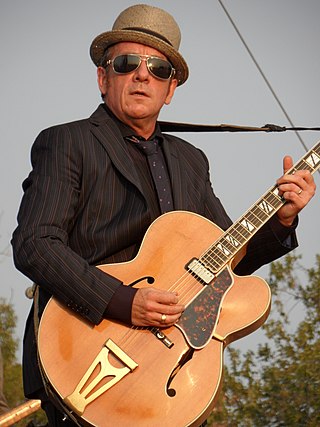
Declan Patrick MacManus, better known by his stage name Elvis Costello, is an English songwriter, singer, record producer, author, and television presenter. Music critics consider Costello to be one of the most gifted and versatile songwriters of his generation. His first album, My Aim Is True (1977), is widely regarded as one of the best debut albums in the history of popular music. The album spawned no hit singles, but contains some of Costello's best-known songs, including the ballad "Alison". Costello's next two albums, This Year's Model (1978) and Armed Forces (1979), recorded with his backing band the Attractions, helped define the new wave music genre. From late 1977 through early 1980, each of the eight singles he released reached the UK Top 30. His biggest hit single, "Oliver's Army" (1979) sold more than 400,000 copies in Britain. He has had more modest commercial success in the US but has earned much praise among music critics. From 1977 through the early 2000s, Costello's albums regularly ranked high on the Village Voice Pazz & Jop critics' poll, with his 1978 album This Year's Model and his 1982 album Imperial Bedroom voted the best album of their respective years. His biggest US hit single, "Veronica" (1989), reached number 19 on the Billboard Hot 100.

Paparazzi are independent photographers who take pictures of high-profile people; such as actors, musicians, athletes, politicians, and other celebrities, typically while subjects go about their usual life routines. Paparazzi tend to make a living by selling their photographs to media outlets that focus on tabloid journalism and sensationalism.

Johnny Suede is a 1991 American film the directorial debut of Tom DiCillo, and stars Brad Pitt, Catherine Keener, Calvin Levels and Nick Cave.

Coffee and Cigarettes is the title of three short films and a 2003 feature-length anthology film by independent film director Jim Jarmusch. The feature film consists of 11 short stories which share coffee and cigarettes as a common thread, and includes the earlier three short films.
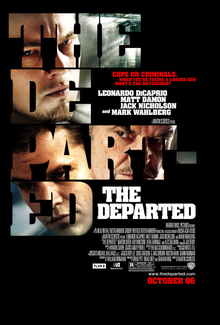
The Departed is a 2006 American crime thriller film directed by Martin Scorsese and written by William Monahan. It is both a remake of the 2002 Hong Kong film Infernal Affairs and also loosely based on the real-life Boston Winter Hill Gang; the character Colin Sullivan is based on the corrupt FBI agent John Connolly, while the character Frank Costello is based on Irish-American gangster and crime boss Whitey Bulger. The film stars Leonardo DiCaprio, Matt Damon, Jack Nicholson, and Mark Wahlberg, with Martin Sheen, Ray Winstone, Vera Farmiga, Alec Baldwin, Anthony Anderson and James Badge Dale in supporting roles.

Living in Oblivion is a 1995 American independent black comedy film, written and directed by Tom DiCillo, and starring Steve Buscemi, Catherine Keener, Dermot Mulroney, Danielle von Zerneck, James LeGros and Peter Dinklage in his film debut. The film won the Waldo Salt Screenwriting Award at the 1995 Sundance Film Festival for DiCillo. It received critical acclaim.

The Real Blonde is a 1997 film directed and written by Tom DiCillo, and starring Matthew Modine, Catherine Keener and Maxwell Caulfield. It is a satire of New York's fashion and entertainment industries.
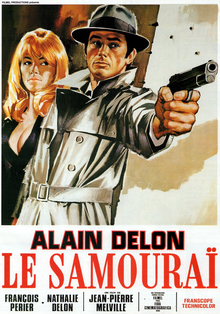
Le Samouraï, is a 1967 neo-noir crime thriller film written and directed by Jean-Pierre Melville and starring Alain Delon, François Périer, Nathalie Delon, and Cathy Rosier. A Franco-Italian production, it depicts the intersecting paths of a professional hitman (Delon) trying to find out who hired him for a job and then tried to have him killed, and the Parisian commissaire (Périer) trying to catch him.

Ronald Edward Galella was an American photographer, known as a pioneer paparazzo. Dubbed "Paparazzo Extraordinaire" by Newsweek and "the Godfather of the U.S. paparazzi culture" by Time magazine and Vanity Fair, he is regarded by Harper's Bazaar as "arguably the most controversial paparazzo of all time". He photographed many celebrities out of the public eye and gained notice for his feuds with some of them, including Jacqueline Onassis and Marlon Brando. Despite the numerous controversies and claims of stalking, Galella's work was praised and exhibited in art galleries worldwide.
Thomas A. DiCillo is an American film director, screenwriter, cinematographer, and musician.
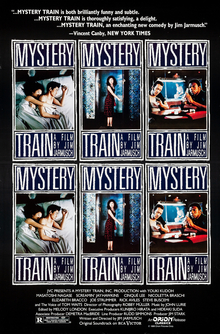
Mystery Train is a 1989 comedy-drama anthology film written and directed by Jim Jarmusch and set in Memphis, Tennessee. The film is a triptych of stories involving foreign protagonists, unfolding over the course of the same night. "Far from Yokohama" features a Japanese couple on a cultural pilgrimage, "A Ghost" focuses on an Italian widow stranded in the city overnight, and "Lost in Space" follows the misadventures of a newly single and unemployed Englishman and his reluctant companions. The narratives are linked by a run-down flophouse overseen by a night clerk and his disheveled bellboy, the use of Elvis Presley's song "Blue Moon", and a gunshot.
"The Last One", also known as "The One Where They Say Goodbye", is the series finale of the television sitcom Friends. The episode serves as the seventeenth and eighteenth episode of season ten; the episode's two parts were classified as two separate episodes. It was written by series creators David Crane and Marta Kauffman, and directed by executive producer Kevin S. Bright. The series finale first aired on NBC in the United States on May 6, 2004, when it was watched by 52.5 million viewers, making it the most watched entertainment telecast in six years and the fifth most watched overall television series finale in U.S. history as well as the most watched episode from any television series throughout the decade 2000s on U.S. television. In Canada, the finale aired simultaneously on May 6, 2004, on Global, and was viewed by 5.16 million viewers, becoming the highest viewed episode of the series.

Double Whammy is a 2001 crime comedy drama film written and directed by Tom DiCillo, and starring Denis Leary, Elizabeth Hurley and Steve Buscemi. Although intended to be released in theaters, it was ultimately distributed direct-to-video.

Billy's Hollywood Screen Kiss is a 1998 American independent, gay-themed romantic comedy film written and directed by Tommy O'Haver and starring Sean P. Hayes, Brad Rowe, and Meredith Scott Lynn. The film was a breakthrough performance for Hayes, who would go from this film to his role as Jack McFarland on the hit television show Will & Grace.

A Very Private Affair is a 1962 French romantic drama film directed by Louis Malle and starring Brigitte Bardot.

A Colbert Christmas: The Greatest Gift of All! is a Grammy Award-winning Christmas special that debuted on Comedy Central on November 23, 2008.
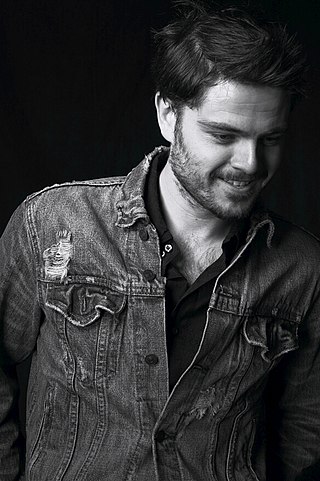
Richard Ian Porterfield Short is an English actor based in Los Angeles. He is starring in the 2017 TV drama series Mary Kills People. In 2017 he appeared in the independent film The Dare and in 2016 Crazy Famous. On television he has had recurring roles on Vinyl and Covert Affairs and has appeared on American Horror Story, White Collar, and Blue Bloods. Short has appeared in more than 30 films and television shows in the USA and UK. On Broadway, he was a member of the 2011 company of Jez Butterworth's Jerusalem at the Music Box Theatre.

Party Party is a 1983 British comedy film about three friends and their North West London crowd. This crowd includes workers, spivs and young police constables. A British entry into the teenage/youth house party genre typified by John Hughes' films. The movie was directed by Terry Winsor and written by Daniel Peacock and Winsor. It is notable for its soundtrack and as the early work of several of the cast members.

"Girls Talk" is a new wave song written by Elvis Costello and first recorded by Dave Edmunds in 1978. Costello gave an early version of the song to Edmunds, who reworked the song and released it on his album Repeat When Necessary. Edmunds' version peaked at number four on the UK Singles Chart and number 12 in Ireland, becoming one of Edmunds' most successful career singles.

"Green Shirt" is a song written by new wave musician Elvis Costello and recorded by Costello with his backing band the Attractions. The song appeared on Costello's 1979 third album, Armed Forces. Lyrically inspired by the influence of the National Front and the Quisling Clinic in Wisconsin, "Green Shirt" features a vocal recorded by Costello after a "night of carousing".


















